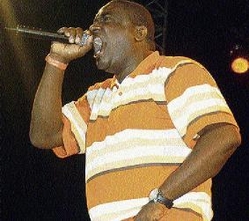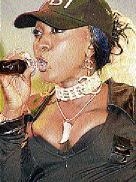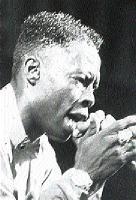


File photos
LEFT: Admiral Bailey performs at Reggae Sunsplash 2006.
CENTRE: DJ Spice
RIGHT: Shabba Ranks
Mel Cooke, Gleaner Writer
WHO SHOULD bell the cat, or better yet, who should put the brakes on the violent and vulgar lyrics which pass for music in some of Jamaica's dance halls?
From this year's monster hit, Rampin' Shop, to the Shabba Ranks, Admiral Bailey and Lady Saw staples, which were deemed, not fit for airplay, the issue of regulation - or rather the lack thereof - has been a contentious issue for Jamaica's music for decades.
The debate was rekindled at a recent Gleaner Editors' Forum dubbed 'The Year in Entertainment 2009'.
During a brief examination of the more erotic side of Jamaican music, producer Michael Barnett commented that there had always been lewd productions which, for the most part, were kept underground.
But he argued that the lewd side of the music is now too easily and freely accessed.
Easy access
That drew the support of entertainment analyst, Clyde McKenzie, who charged that there was a lack of political will to enforce the laws in place to regulate the music industry and the publication of some material.
According to McKenzie, it is just too easy for adult material to reach the ears of those not interested.
"The public spaces need to be sanitised," argued McKenzie.
"We have a system where the authorities are regulating retrospectively and not prospectively," McKenzie said as he pointed to the Broadcasting Commission's clampdown on the media and the latest drive by the police to arrest the lewd music on buses.
McKenzie argued that the absence of a designated programme manager at some radio stations was opening the door for disc jockeys to play inappropriate songs at all times of the day.
Introduce measures
He called on the music industry to introduce measures to regulate itself.
However, the notion of self-regulation does not sit well with Desmond Young, president of the Jamaica Federation of Musicians (JFM).
Young charged that there was no professional group in Jamaica, including the police and politicians, which had regulated itself to the satisfaction of the general population.
According to Young, the country's legal framework should be used to deal with aberrant behaviour.
"Whose standards are you going to impose on people?" Young asked, as he pointed to the impracticality of self-regulation.
He argued that the society had changed from being generally Christian, to being more diverse in beliefs.
The JFM president further claimed that self-regulation, was "more like an ideal".
Furthermore, Young said that there were many sectors in the music industry, with persons overlapping. "Is there a producers' association?" he asked. "Who would regulate the producers?"
"It would be nice if it could work, but I don't see where that would work," Young said.
And while the JFM expects that it would be consulted about any legal measures that would be put in place to further regulate the music industry, it is not confident that its views would be taken on-board.
"Sometimes people consult but don't listen. People will talk to you just to say you were part of the process," added Young.